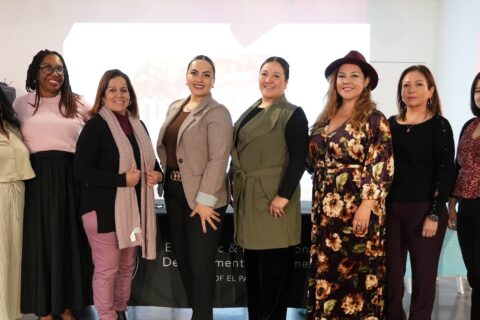NLC Inclusive Entrepreneurship Workshop Event Summary
In late May, the National League of Cities welcomed representatives from 40 cities to Washington, DC for its inaugural Inclusive Entrepreneurship Workshop. The objective of the workshop was simple: to accelerate the sharing of ideas and policies to level the playing field and create greater economic opportunities for historically excluded entrepreneurs.
Three primary levers for change were addressed:
- Increasing access to contracting and procurement opportunities.
- Expanding access to capital
- Boosting the resiliency of America’s small businesses through Community Navigator-style programs and strategic outreach
Many of the cities in attendance also participate in NLC’s Inclusive Entrepreneurship Network and made specific commitments to implementing one or more initiatives focused on the 3 topics above.
The workshop was a unique opportunity for attendees to collaborate with other city leaders and representatives from the federal, nonprofit, and civic sectors. Many of the ideas shared during the event are captured below; they include both observations of the current state of American entrepreneurship as well as concrete action steps for local leaders.
Boosting Small Business Resiliency
- Build out disaster preparedness plans for your smallest businesses. No one knows exactly how the next crisis will affect the economy, but if experience is any indicator, businesses with fewer than 50 employees will be disproportionately impacted. We discussed the need for more cities to develop contingency plans for addressing the economic impact of the next pandemic or extreme weather event on small businesses, specifically.
- Prioritize customer service. Navigating city administrative and regulatory processes is rarely a user-friendly experience for small businesses, especially among historically excluded communities. Cities can build trust with these communities by creating an office specifically dedicated to addressing their needs, and by removing language barriers so all entrepreneurs can access government support.
- Use publicly available data to design and locate new outreach strategies. Often, there are other entities more closely connected to small businesses than local government, especially when it comes to businesses in informal sectors. Utilizing publicly available information, as well as data collected from community-based organizations, helps alleviate blind spots and puts local leaders in a better position to map their entrepreneurial ecosystem and design the appropriate outreach.
- Create resources to help small businesses pivot. COVID-19 brought to light the need to help entrepreneurs in pivoting their business models. As markets continue to change, cities and entrepreneurship support organizations (ESOs) can create programs and initiatives to help small businesses enter new industries, revamp revenue streams, and participate in specialized programs for switching industries.
Increasing Access to Capital
- The learning curve is steep for non-traditional financing. The promulgation of small business financing besides debt is a positive development, but the mere existence of these tools does not mean they will be equitably utilized. Confusion and apprehension around non-debt vehicles like equity crowdfunding, revenue-based finance, and venture capital has been a common theme throughout NLC’s capital access cohorts this year. To scale these financing mechanisms in a manner that is inclusive, cities and ESOs need to provide consistent educational opportunities for entrepreneurs who may benefit from them, as well as highlight success stories of underrepresented entrepreneurs who have led successful fundraising campaigns.
- Why aren’t more cities helping push down the cost of capital? Cities are rarely the best entity to make direct loans to small businesses but can play an important role in encouraging private investment through loan loss reserve funds or by participating in revolving loan fund programs. According to attendees, surprisingly few cities participate in these types of programs, which are intended to increase the flow of capital to enterprises that would otherwise be excluded.
- Localities underutilize state and federal funding sources to capitalize on entrepreneurs. Related to the previous point, there are numerous state and federal programs cities can participate in to increase access to capital for historically excluded entrepreneurs. Local capacity to apply for and administer these programs remains a challenge, so small and/or rural municipalities should identify opportunities where they can pool resources with other municipalities in their region. One of the best examples of this strategy is the NetWork Kansas E-Community Partnership.
- Regional, formal collaboration between capital providers is necessary. Collaboration between capital providers is integral to ecosystem sustainability and effective mayors often utilize their convening power to regularly bring together financial institutions, especially community development financial institutions (CDFIs) to facilitate client referrals and align on investment strategies. CDFI Friendly Bloomington is a good example. Cities can also play a role in disseminating information about where CDFIs operate and what kind of lending they do.
Expanding Access to Government Contracts
- Make the business case for inclusive procurement. Entrenched interests can be a major roadblock to implementing the kind of procurement reform required to enable historically underutilized businesses to fairly compete on contracting opportunities. Inclusive procurement – where all ready, willing, and able businesses can compete fairly – promises significant benefits to the local economy. A more inclusive approach keeps dollars circulating locally, promotes competition, and accelerates the development of local small businesses.
- Break down large contracts when sensible. Cities can pilot more inclusive procurement practices by identifying a large contract that can be broken up so that small, local businesses can bid on it. Good candidates for this frequently include landscaping and maintenance contracts that occur in multiple locations around a city. You can learn more about other inclusive procurement strategies here.
- Subsidize or streamline certification costs for minority- and women-owned business enterprises. Certification can help MWBE firms gain access to government contracts, but the certification process can be overly cumbersome or expensive for them to navigate or apply for. Cities can consider eliminating or subsidizing certification costs to encourage more businesses to apply for certification. Other recommendations for streamlining certification processes and re-engineering city procurement to be more inclusive can be found here from the Government Performance Lab at Harvard Kennedy School.
- Set supplier diversity goals with a consortium of anchor institutions. Cities have the convening power to bring together anchor institutions – hospitals, universities, utility companies, etc. – to establish agreed upon, common, and achievable goals for increasing supplier diversity. By creating a consortium of anchor intuitions dedicated to inclusive procurement, these organizations can share resources to identify buyer-ready businesses and continue to strengthen their investment in the local community. Several anchor strategies are included in this report from LISC.









